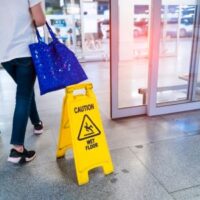How “Reasonable Inspection” Policies Can Affect a Georgia Slip-and-Fall Case

Retail establishments such as supermarkets have a duty under Georgia law to keep all public areas of their premises in reasonably safe condition. If a customer is injured due to a store’s failure to meet this duty, the owner can be held legally responsible for the customer’s injuries, including any non-economic damages like pain and suffering.
Oftentimes in these cases, the store will argue it lacked actual knowledge of the safety hazard that caused the accident beforehand. But Georgia law also imposes “constructive knowledge” requirements on property owners in these cases. Basically, a store open to the public must have reasonable inspection procedures in place to identify problems before a customer is hurt.
Publix Faces Lawsuit Over Spilled Water in Floral Department
An ongoing personal injury lawsuit in Georgia federal court, York v. Publix Super Markets, Inc., illustrates how constructive knowledge requirements work. In this case, the plaintiff was injured in a slip-and-fall accident at a Publix store in Alpharetta. More precisely, the plaintiff was walking through the store’s floral department. Store employees subsequently found water on the floor where the plaintiff fell.
Water on the floor is a known hazard in floral departments, as customers frequently remove flowers from the display canisters, which contain water. For this reason, Publix made plastic flower bags available to minimize the risk of water dripping on the floor when customers took flowers. Of course, customers do not always use the bags. So Public also trained its employees to “keep a towel in their pockets to equip them to take care of small spills” and “inspect their surroundings and to pick up anything that is out of place.”
Before the trial court, Publix argued these policies established that it took “reasonable” steps to prevent slip-and-fall accidents in its stores. But the judge noted that the real question was “whether Publix’s policy was reasonable for the floral department,” where the store itself admitted water on the floor was often “impossible to detect through its normal inspection procedures.” Indeed, the plaintiff introduced as evidence a 30-minute surveillance video taken of the floral department where multiple customers retrieved wet flowers and no employee was present.
More to the point, it is not enough for a store to have a reasonable inspection policy. It must also follow that policy. In this case, the plaintiff alleged that no Publix employee actually inspected the floral department for over an hour prior to her slip and fall. Publix maintained that at least one employee “walked through” the area. The judge said it would be left to a jury to decide if Publix actually took reasonable steps to keep the floral department safe.
Contact Hawkins Spizman Trial Lawyer Today
If you have been seriously injured while in a building or premises open to the public, it is important to seek out qualified legal advice from a skilled Alpharetta personal injury attorney. Contact Hawkins Spizman Trial Lawyers today to schedule a free consultation. We serve clients throughout Georgia including Atlanta, Dunwoody, Alpharetta, Cobb County, Fulton County, Gwinnett County, Johns Creek and Sandy Springs.
Source:
scholar.google.com/scholar_case?case=15025008239561629947
